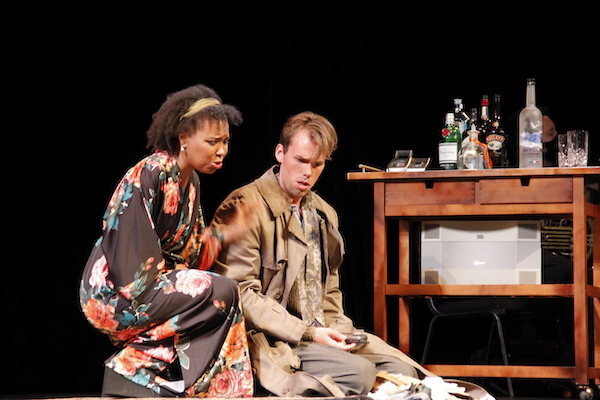FGO’s vivid New York trilogy engages the mind and touches the heart

One rarely thinks of opera librettos as realistic, unlike theatrical or cinematic scenarios. But the three one-act plays of Daron Hagen’s New York Stories are authentic “slice of life” dramas set to compelling music. Florida Grand Opera’s production of this vivid trilogy opened Saturday night at the Miami Theater Center in Miami Shores and proved a winner in every respect.
Set to literate texts by Hagen and Barbara Grecki, the three mini-operas tell the stories of ordinary people caught in situations that are tragic, anxious and joyous, much like life itself. Hagen’s unpretentious scores really sing out in a distinctly American manner, yet mask a plethora of underlying complexity.
The casts of all three works comprised members of the FGO Studio Artists program.
‘Broken Pieces,” the 30-minute opening story, is the longest of the three works. Pamela, a divorcee who has been waiting nearly a year for the tiles to be fixed in her apartment bathroom, receives an early morning visit from Antonio, a repairman. Uncharacteristically, he is fully dressed in a suit. When Pamela inquiries about his clothes, Antonio reveals that he has come from proposing to his girlfriend who has rejected him. A budding mutual attraction between them suggests that, although Antonio has completed the repairs, they will be seeing more of each other.
The orchestral prelude suggests the two characters’ loneliness. Elongated arias for both principals are shaped as lyrical narratives of their failed attempts at love while the acerbic orchestral undercurrents suggest a surging rollercoaster of emotions and inner turmoil. Hagen’s intelligent score adroitly spins Pamela and Antonio’s rapid journey from standoffish introductions to near affection.
As Pamela, Stephanie Doche was alternately nervous, poignant and funny with a richly colored mezzo to make the heroine’s outbursts take flight. Displaying exceptionally clear diction, Michael Miller’s finely proportioned baritone and strong high register embodied Antonio’s underlying gentleness and sensitive persona. Doche and Miller’s voices blended to ingratiating effect in a duet symbolizing the characters’ nervousness and newfound mutual respect.
“Just for the Night” finds Babs, a socialite, receiving an unexpected visit on Christmas Eve from her brother Chip who is homeless. Alternately recalling times past from their youth and displaying ranting incoherence and instability, Chip’s mental condition frightens Babs and makes her admit the sadness of her own life under her highbrow icy exterior. Rejecting his plea to stay overnight, she gives him some cash and bids him farewell. The moody, churning orchestral writing underscores the tragedy of both their lives.
Amanda Sheriff confirmed the strong impression she made in last month’s production of Jake Heggie’s Three Decembers. Her sleek manner aptly portrayed Babs’ social status while her reaction to Chip’s disintegration brought the emptiness of her superficial existence to the fore. Deploying a soprano of strength, tonal beauty and dramatic depth, Sheriff was riveting. Miller was, at times, frightening in Chip’s unhinged monologues but he also engendered sympathy for his deterioration from business genius to mentally ill shelter dweller.
The finale, “Cradle Song,” pictures two composers arriving home at their apartment in Harlem with their infant son after attending a concert. They take turns attempting to lure the child to sleep while gossiping about Pamela, Antonio, Babs and Chip, bringing the three operas full circle. The male musician wittily comments that Elliot Carter’s First Quartet (presumably heard at the concert) made his stomach churn. Both parents feel their child has given them a greater sense of human empathy and love. Together they compose a cradle lullaby of lieder-like beauty. Unlike the protagonists of the first two opuses, the anonymously identified Mama and Papa are happy. Hagen’s musical elements suggest joy, song-filled melody and blues-fueled patterns in a portrait of artists balancing academic, creative and parental roles.
Doche and Miller (the latter doing triple duty) played a sophisticated New York couple. They displayed real chemistry, singing with unforced immediacy while suggesting their own sense of wonder and fulfillment through their child’s innocence.
Andrew Bisantz drew out the subtleties and restless patterns of Hagen’s orchestral scoring while coaxing brightly textured playing from the small ensemble, seated onstage to the right of the playing area. Jeffrey Buchman’s briskly paced, character driven staging delineated the protagonists’ hopes and dilemmas. Suggestive settings (plush and utilitarian sofas, a keyboard for the composes) defined, the city’s varied milieus. Howard Tsvi Kaplan’s array of mini-hued costumes matched each character’s’ personal and occupational role in these tales of the big city.
There is one remaining performance. New York Stories is lyric theater that warms the heart and lifts the spirit–the perfect confection for a Valentine’s Day weekend.
Florida Grand Opera repeats New York Stories 3 p.m. at the Miami Theater Center, 9806 NE 2nd Avenue in Miami Shores.
FGO presents a double bill of Leonard Bernstein’s Trouble in Tahiti and Thomas Pasatieri’s Signor Deluso March 20 and 21. fgo.org
Posted in Performances
Leave a Comment
Sun Feb 14, 2021
at 11:43 am
No Comments